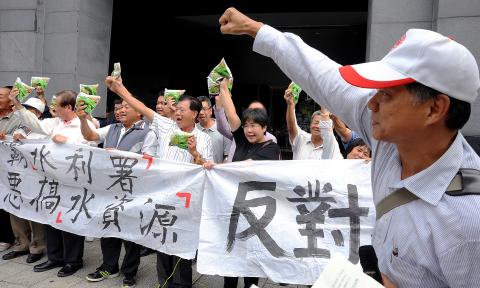Environmentalists and farmers from Pingtung County and Greater Kaohsiung yesterday staged a protest against the Gaoping Great Lakes (高屏大湖) project, which they fear would divert water used for farming and damage local soybean production.
A project of the Water Resources Agency’s (WRA) Southern Region Water Resources Office, it would build five manmade lakes in a nearly 700-hectare area covering many farms at the border of Pingtung County’s Ligang Township (里港) and Greater Kaohsiung’s Meinong District (美濃).
The project was originally part of the Jiyang artificial lake project, which passed an environmental impact assessment in 2002, for cross-border water channeling and to save water during dry seasons.

Photo: Liu Hsin-de, Taipei Times
After severe flooding in the south caused by Typhoon Morakot in August 2009, the project was modified to become part of a southern Taiwan water stabilization project by the WRA. It was further modified into a three-phase project, with the first artificial lake — covering about 200 hectares — being constructed in the first stage.
About a dozen protesting farmers held bags of green soybeans in front of the EPA’s offices yesterday, saying that the project risked damaging their livelihood.
A member of a farmers’ association said that the area produces between 30,000 tonnes and 50,000 tonnes of quality green soybeans for export, which bring in about NT$400 million (US$13.7 million) annually.
More than 10,000 farmers and workers at food processing companies rely on the green soybeans for their living, they said, adding they feared that farmland leased from the state-run Taiwan Sugar Corp would be reclaimed or the construction project would damage the surrounding natural environment.
Frank Yang (楊俊朗), of the civic group Citizen of the Earth, Taiwan, said that the results of the WRA’s evaluation, based on data collected from 2007 to 2010, showed that the level of groundwater in the area was high and building artificial lakes would not only be a waste of arable land, but would also cause damage because of extensive extraction.
The project aims to channel excess water from the Nanhua Reservoir (南化水庫) and the Gaoping River Dam (高屏溪攔河堰), but the only time the two areas have excess water is in summer, Yang said.
Moreover, since the target areas do not suffer from a water shortage during summer, he questioned why the government should spend billions of dollars to construct manmade lakes that would have very limited benefits.
An ad hoc EIA meeting yesterday concluded that the WRA must submit supplementary information to explain the committee’s questions on the project for further discussion in the next meeting.

The manufacture of the remaining 28 M1A2T Abrams tanks Taiwan purchased from the US has recently been completed, and they are expected to be delivered within the next one to two months, a source said yesterday. The Ministry of National Defense is arranging cargo ships to transport the tanks to Taiwan as soon as possible, said the source, who is familiar with the matter. The estimated arrival time ranges from late this month to early next month, the source said. The 28 Abrams tanks make up the third and final batch of a total of 108 tanks, valued at about NT$40.5 billion

A group from the Taiwanese Designers in Australia association yesterday represented Taiwan at the Midsumma Pride March in Melbourne. The march, held in the St. Kilda suburb, is the city’s largest LGBTQIA+ parade and the flagship event of the annual Midsumma Festival. It attracted more than 45,000 spectators who supported the 400 groups and 10,000 marchers that participated this year, the association said. Taiwanese Designers said they organized a team to march for Taiwan this year, joining politicians, government agencies, professionals and community organizations in showing support for LGBTQIA+ people and diverse communities. As the first country in Asia to legalize same-sex

Travel agencies in Taiwan are working to secure alternative flights for travelers bound for New Zealand for the Lunar New Year holiday, as Air New Zealand workers are set to strike next week. The airline said that it has confirmed that the planned industrial action by its international wide-body cabin crew would go ahead on Thursday and Friday next week. While the Auckland-based carrier pledged to take reasonable measures to mitigate the impact of the workers’ strike, an Air New Zealand flight arriving at Taipei from Auckland on Thursday and another flight departing from Taipei for Auckland on Saturday would have to

MOTIVES QUESTIONED The PLA considers Xi’s policies toward Taiwan to be driven by personal considerations rather than military assessment, the Epoch Times reports Chinese President Xi Jinping’s (習近平) latest purge of the Chinese People’s Liberation Army (PLA) leadership might have been prompted by the military’s opposition to plans of invading Taiwan, the Epoch Times said. The Chinese military opposes waging war against Taiwan by a large consensus, putting it at odds with Xi’s vision, the Falun Gong-affiliated daily said in a report on Thursday, citing anonymous sources with insight into the PLA’s inner workings. The opposition is not the opinion of a few generals, but a widely shared view among the PLA cadre, the Epoch Times cited them as saying. “Chinese forces know full well that